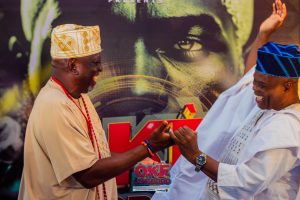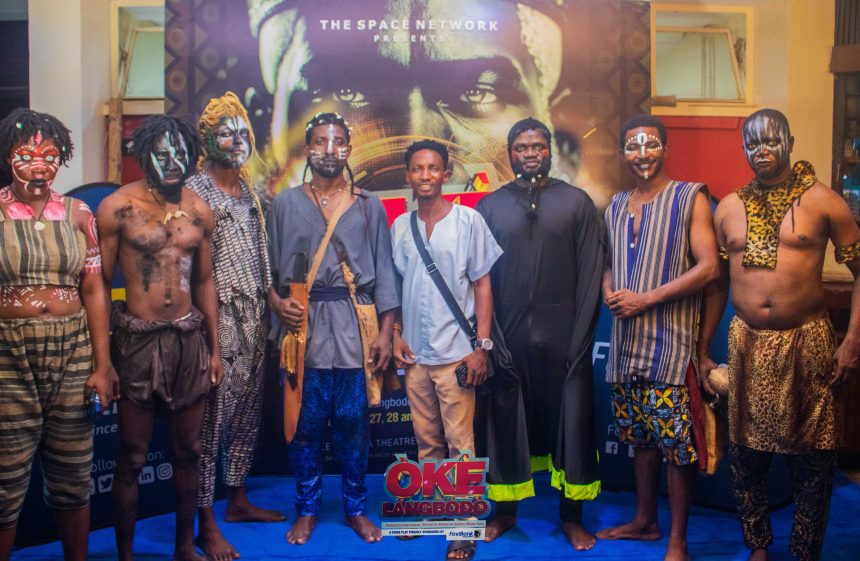Akeem Lasisi
The robust beauty of theatre came alive weeks ago when Wale Ogunyemi’s play, Oke Langbodo, was staged at the University of Ibadan. Produced by multi-talented actor, Ropo Ewenla, and directed by Babatunde Ojobaro, the performance was sponsored by First Bank — a gesture that made a huge difference as the production lacked no spectacle in all departments and aspects.
Unleashing seven great hunters on the metaphoric Langbodo forest, all in search of a phenomenon that would bring succour to the land, the project was according to Ewenla, conceived as a re-imagination of the Ogunyemi’s 1977 play, adapted from Wole Soyinka’s The Forest of a Thousand Daemons, which in turn is a translation of the Yoruba novel, Ogboju Ode Ninu Igbo Irunmole, written by D.O Fagunwa. Ewenla’s hunters retained their symbolic names, which was an attraction for the audience as Àkàrà Oògùn (acted by Lumide Femi), Kàkó (Femi Omole), Elégbèdè (Elijah Adebayo), Ẹ̀fò Ìyẹ́ (Adekunle Ahmed), Àràmọ̀dà Okunrin (Afolabi Oladiran) Ìmọ́dòye (Temitope Agoro) and Olóhùn Iyọ̀ (Adejare) are tags ever pregnant with intriguing dispositions. A stage freak, Ewenla, who has taken part in many big plays and films, including Wole Soyinka’s The Trials of Brother Jero, Kunle Afolayan’s Anikulapo and Showmax’s Wura, inspiringly opened the show as Old Àkàrà Oògùn. According to him, Lagos is the next destination for the play, even as he urged sponsors to come on board.
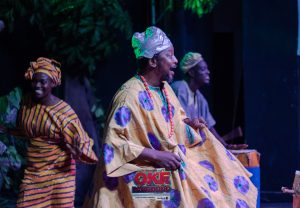
The Langbodo expedition story is actually not alien to the stage. It has been performed times over the years and in many places. To thus impress folks who have seen it on different occasions, any producer and director staging it anew have to go the extra mile. Ewenla and Ojobaro achieved this as the audience, which continually filled the Wole Soyinka Theatre venue at UI, had a great moment that many of them spoke about.
The big treat was that they licentiously modernised major elements of the play. Although the forests remained as scary as you will find in Ogboju Ode, it was punctuated with new-generation appearances and activities that include Gen-Z-style romance. The ambition, if not audacity, worked well because it brought the story and theme closer to the audience, many of whom were youths. Even for old folks who had watched Ogboju Ode/Langbodo before, the ‘funkifisation’ offered them a new experience and an opportunity to compare. Interestingly, a veteran like Bimbo Manuels also watched the First Bank-sponsored play.
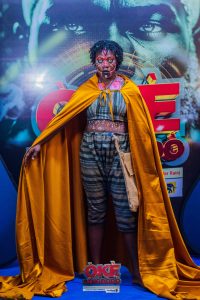
Among the modernised elements were versatile songs, dances and costumes that gave the production a vibrant life. In some parts, the old flavours were retained. But, in the same play you heard moving ijala chants, particularly by Olohun Iyo, the director still unleashed on Akaraogun and his men hip hop and afrobeats sounds that added more intrigues and humour to the presentation. Also, it was interesting seeing Akaraoogun in a trendy kampala dress, smartly cut for the great hunting expedition. With such artistic liberty, the lights had a lot to play upon on stage.
Ewenla’s Langbodo also made a gender-balancing point as Imodoye was cast as a lady. Her wisdom and strength were a boost to the hunters, including when she had to persistently minister against the excesses and tantrum lavishly exhibited by some of the men. Of course, she too was metaphysically strong as she had, according to her, lived with spirits for 17 years after she was snatched from her parents.
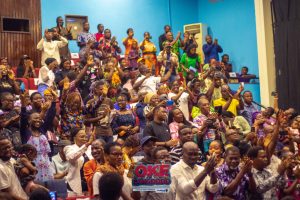
The battles were fierce and intriguing since the hunters encountered various dangerous spirits on their way to the desired land. These included hard-fighting Agbako and ever-weeping Egbere. Part of the new stuffs the director injected into the play are modern towns and people representing different ethnic groups in Nigeria. Well, at the end, the hunters’ valour paid off as they realised their target, though the sacrifices were so expansive that only three of the seven returned.
On the whole, the cast and crew did justice to the play. They were able to deliver the theme while still keeping the audience entertained from the beginning to the end. It was such a successful production that gave the sponsors too a sense of fulfilment.
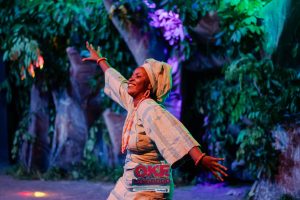
First Bank’s Group Head of Marketing and Corporate Communications, Ms. Folake Ani-Mumuney, noted that the financial organisation had always supported the sector because of the cultural and socio-economic values embedded in it.
She said, ‘‘For over 130 years, FirstBank has been a steadfast supporter of the creative arts, consistently enabling the giants in our artists, by fostering creativity and national unity. This programme serves as an umbrella platform encompassing a diverse range of artistic expressions that includes stage theatre productions that bring captivating stories to life; fashion shows that celebrate style and creativity; vibrant carnivals that showcase our cultural heritage; and electrifying concerts that unite us through music. Oke Langbodo is another partnership opportunity for making a profound impact and reinforcing our commitment to empowering the creative sector.’’
While Otunba (Giwa) Deji Osibogun, Executive Producer, stated the enactment came at a crucial period in Nigeria’s evolution, Ewenla said Langbodo was significant because it was a time to re-emphasise the need to shun individuality and embrace the uniqueness of the country’s diversity as a people seeking national rebirth.
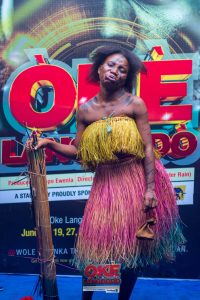
“On this enchanting and engaging artistic journey, our message is of peace, unity, selflessness, devotion, perseverance, and commitment to enabling ideals that can sustain our humanity. Oke Langbodo is a play that connects with us as a nation in our constant aspiration for energy and purpose,” he stressed, while expressing appreciation to First Bank..
On his part, Ojobaro averred that Òkè Lángbódò’s journey by the veteran seasoned hunters served as a powerful metaphor for the state of our nation, Nigeria.
He explained in the Director’s Note: “It suggests that all sons and daughters of the land must contribute to nation-building. Just as hunters from various villages responded to a call of duty, Nigerians, regardless of ethnic group, political divide, position held or social class, should rise to fulfil the civic tasks necessary to bring peace to our land. With wisdom, the distinct vision of a leopard poised to strike, affirmation, resilience, and teamwork directed toward national growth, we may stumble, but we shall rise and win.”
